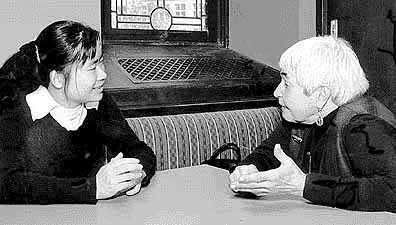Princeton Weekly Bulletin, March 30, 1998
What's an Indonesian face-off?
By Caroline Moseley
|
|
|
|
|
Chances are, if you are a speaker of American English, you do. Chances are equally good that nonnative speakers of American English won't have any idea what you mean.
Idioms can present a particular problem to foreign visitors, says Betty Klingebiel, codirector of the English Conversation Program for Foreign Graduate Students and Visiting Scholars, which is funded by the Friends of the International Center.
Even though Princeton's international students and fellows may have studied English for many years, "There are a lot of words and expressions you don't get by reading books," points out Wolfgang Spitzer, an instructor in physics from Austria who is a student in the program.
University, community tutors
Klingebiel, who taught English in Tokyo for four years, says that 70 students and scholars are taking advantage of the free program this year, working with an equal number of volunteer tutors.
The tutors, she says, are from the University and the community. Some have previous teaching experience, some do not, but all share "an interest in foreign cultures and in helping others," says Klingebiel. The tutors meet their students once a week for an hour, at a time and place that is mutually convenient. Common venues are Murray Dodge Hall, Chancellor Green Student Center and Stevenson Hall.
The International Center offers several sessions during the year to guide tutors who have no previous language teaching experience. Lawrence Mansier, a former high school English teacher and codirector of the conversation program, gives a workshop for tutors in September. There is a followup workshop in January and a workshop and luncheon for teachers and students in May.
The IC also provides a collection of printed materials to the language tutors, such as the "Guide for the Volunteer English Teachers" (published by the National Association for Foreign Student Affairs) and 101 American English Idioms (Passport Books, 1996). These materials are located at the IC office in Stevenson Hall.
Tricky headlines
It is difficult to generalize about the conversation sessions, as much depends upon the student's language facility and particular interests. Judith Rowe, social science data specialist at Firestone Library, meets weekly with Xiaoxia Lin (known as 'Nina'), a graduate student in chemical engineering from Beijing.
"We talk about customs and ceremonies, about my family and her family," says Rowe. "We talk about all sorts of things. A while back, she asked me about some of the campus buildings, so we went on an Orange Key tour."
Spitzer has appreciated working on idioms such as "You're pulling my leg" and "straight from the horse's mouth" with his tutor, Leo Brenner, a former engineer. "I also have trouble with newspaper headlines," Spitzer says. "They are short and very difficult. I have to read the article to understand what the headline could mean." He cites "Indonesian Face-off" as a recent example, which he took to his tutor. "'Indonesian' I knew, of course," he says, "But 'face-off?'"
Tom Moore, assistant music librarian in the Scheide Music Library, meets weekly with Takaya Kishi, a graduate student in the Woodrow Wilson School. "We work from the books and other material at the International Center," says Moore. One useful resource discusses nonverbal communication, which, Moore points out, "can mean quite different things in different cultures." An example, he says, is "the 'A-OK' sign of finger and thumb together, which is an obscene gesture in Brazil."
Insight, friendship
Volunteers say they enjoy the insight into foreign cultures offered by their weekly meetings. Many enjoy the friendship that develops over the course of an academic year. Says Rowe, "My mother died in February. When Nina heard, she sent me a sweet e-mail message, suggesting that we should go to dinner and the movies, and we did."
For Moore, "I guess I get the same sort of psychological rewards as I do from reference library work. People come to me with a problem, and I can help solve it."
Those interested in volunteering for the English Conversation Program should call the International Center at 258-5006. Take the bull by the horns, and give it your best shot.
